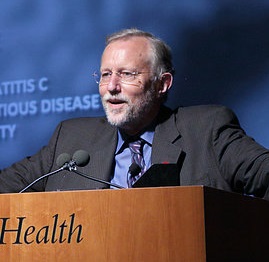Charles M. Rice
Charles M. Rice is an American virologist renowned for his significant contributions to the field of virology, particularly in the study of hepatitis C virus (HCV). Born on August 25, 1952, in Sacramento, California, Rice has played a pivotal role in understanding the life cycle of HCV and the development of antiviral drugs to treat it, efforts that have had a profound impact on global health.
Early Life and Education[edit | edit source]
Charles M. Rice received his Bachelor of Science degree in Zoology from the University of California, Davis in 1974. He then pursued graduate studies at the California Institute of Technology (Caltech), where he earned his Ph.D. in Biochemistry in 1981 under the mentorship of James H. Strauss. His doctoral research focused on the replication of alphaviruses, a group of RNA viruses.
Career and Research[edit | edit source]
After completing his Ph.D., Rice conducted postdoctoral research at the Institut Pasteur in France and at the Stanford University School of Medicine. In 1986, he joined the faculty of the Washington University School of Medicine in St. Louis, where he began his groundbreaking work on hepatitis C. His research has been instrumental in understanding how HCV replicates and interacts with its host, leading to significant advancements in the treatment and management of the disease.
In 2001, Rice became the Maurice R. and Corinne P. Greenberg Professor in Virology at The Rockefeller University, where he has continued his research on HCV and other related viruses. His work has been pivotal in the development of direct-acting antiviral (DAA) drugs, which have revolutionized the treatment of hepatitis C by offering cure rates exceeding 90%.
Awards and Honors[edit | edit source]
Charles M. Rice has received numerous awards and honors for his contributions to science and medicine, including the Lasker Award in 2016 for his work on hepatitis C. In 2020, he was awarded the Nobel Prize in Physiology or Medicine along with Harvey J. Alter and Michael Houghton for their discovery of the hepatitis C virus, a landmark achievement in the fight against viral diseases.
Impact and Legacy[edit | edit source]
Rice's work has had a profound impact on the field of virology and on the lives of millions of people affected by hepatitis C worldwide. His research has not only advanced our understanding of viral replication and pathogenesis but also led to the development of effective treatments that have significantly reduced the burden of this disease.
Selected Publications[edit | edit source]
Charles M. Rice has authored and co-authored numerous scientific papers that have been published in prestigious journals. Some of his most notable publications include studies on the molecular biology of HCV replication, the development of HCV replicon systems, and the identification of antiviral targets for therapeutic intervention.
See Also[edit | edit source]
Translate: - East Asian
中文,
日本,
한국어,
South Asian
हिन्दी,
தமிழ்,
తెలుగు,
Urdu,
ಕನ್ನಡ,
Southeast Asian
Indonesian,
Vietnamese,
Thai,
မြန်မာဘာသာ,
বাংলা
European
español,
Deutsch,
français,
Greek,
português do Brasil,
polski,
română,
русский,
Nederlands,
norsk,
svenska,
suomi,
Italian
Middle Eastern & African
عربى,
Turkish,
Persian,
Hebrew,
Afrikaans,
isiZulu,
Kiswahili,
Other
Bulgarian,
Hungarian,
Czech,
Swedish,
മലയാളം,
मराठी,
ਪੰਜਾਬੀ,
ગુજરાતી,
Portuguese,
Ukrainian
Navigation: Wellness - Encyclopedia - Health topics - Disease Index - Drugs - World Directory - Gray's Anatomy - Keto diet - Recipes
Search WikiMD
Ad.Tired of being Overweight? Try W8MD's physician weight loss program.
Semaglutide (Ozempic / Wegovy and Tirzepatide (Mounjaro / Zepbound) available.
Advertise on WikiMD
WikiMD is not a substitute for professional medical advice. See full disclaimer.
Credits:Most images are courtesy of Wikimedia commons, and templates Wikipedia, licensed under CC BY SA or similar.Contributors: Prab R. Tumpati, MD

